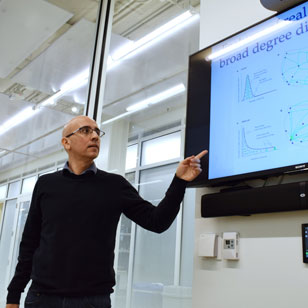
Santo Fortunato
Santo Fortunato, a professor at the School of Informatics, Computing, and Engineering and the director of the Indiana University Network Science Institute (IUNI), has been awarded a grant from the National Science Foundation’s Accelerating Research through International Network-to-Network Collaborations (AccelNet) program, which aims to accelerate the process of scientific discovery and prepare the next generation of U.S. researchers for multi-team international collaborations.
AccelelNet-Multinet is an international network of networks focused on researching multilayer networks, that is, how individual networks interact with one another. From infrastructure networks formed by systems such as the power grid and the internet, to multilayer social and communication networks to the brain and biological networks of the cell, one network is often interdependent on the function of another network. Six hub institutions, along with about 100 leading scholars in the field, will come together to tackle pressing issues in multilayer network science through international exchanges, meetings, an virtual seminar series, and ongoing collaborative research.
“The core of AccelNet-MultiNet is to collaborate with our European partners via exchanges of scientific personnel,” Fortunato said. “Over the course of five years, 20 researchers from IU and Northeastern University, mostly graduate students, will be spending a semester in one of the partner institutions in Europe, and 20 researchers from those institutions will do the same in the U.S. They will be working on projects of common interest within the scope of multilayer network science.”
For instance, one of the projects that will be part of the effort include uncovering the structurFe and dynamics of the “societal multiplex,” which is the network of social interactions occurring via different media (e.g, offline, phone, Twitter, Facebook, etc.) and the multilevel network of contacts between people (school, household, workplace, etc.), which help predict and control the spread of epidemics.
Fortunato is joined by co-principal investigator Ann McCranie, the assistant director of research administration at IUNI, along with the Network Science Institute (NetSI) at Northeastern University, which is led by Alessandro Vespignani, a former professor at SICE, on the project. IUNI and NetSI will partner with four European institutions in the effort, including the University of Barcelona, ISI Foundation in Turin, Italy, the Central European University in Budapest/Vienna, and the CNRS in Marseille.
“Leading and shaping the international community of researchers working in network science is one of the primary goals of IUNI,” Fortunato said. “When the call came out for the AccelNet program, it felt natural to go for it. This my first grant as a PI here at IU, and I am happy to be leading such an ambitious program that will make IUNI and SICE very visible both nationally and in Europe. Building a strong network science community is a necessity, and it is important that IU stands at the forefront of this endeavor.”
The total amount of the grant is $1.9 million over five years, with IU receiving $980,000.
“We’re excited to be a part of the AccelNet program, and it shows the important leadership role Santo and the IUNI is taking in this critical field,” said Raj Acharya, dean of SICE. “Our faculty are constantly looking for opportunities to collaborate with our partners around the globe, and this effort will allow SICE to build on its reputation.”

